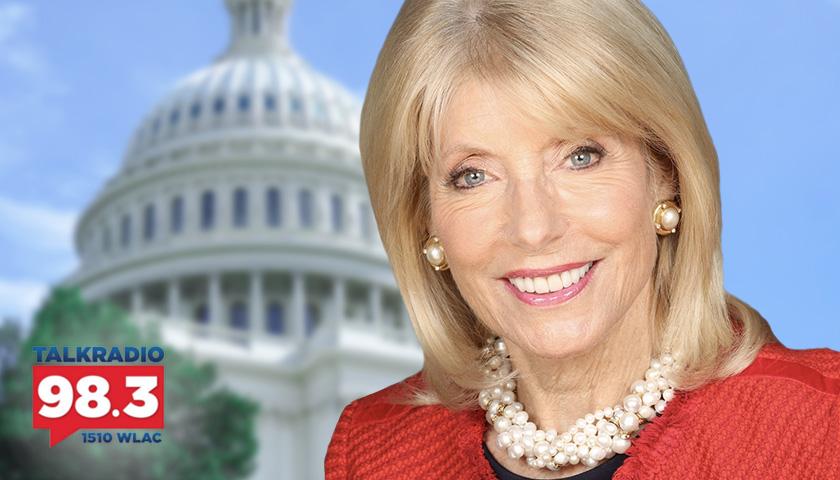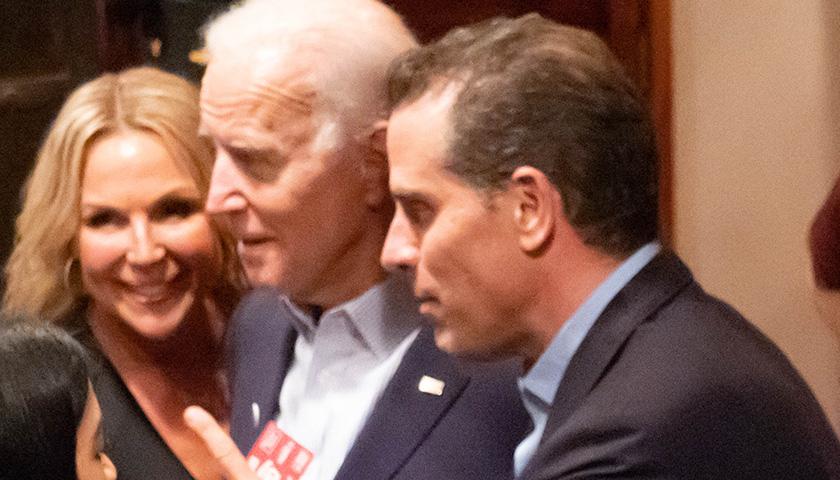Live from Music Row, Monday morning on The Tennessee Star Report with Michael Patrick Leahy – broadcast on Nashville’s Talk Radio 98.3 and 1510 WLAC weekdays from 5:00 a.m. to 8:00 a.m. – host Leahy welcomed Fox News contributor and Wall Street guru Liz Peek to the newsmaker line to talk about the current economic condition, job loss, inflation, federal spending, and the possibility of a recession.
Leahy: On the newsmaker line right now, our very good friend, the best economic expert there is out there Fox News contributor, Liz Peek. Good morning, Liz!
Peek: Good morning. Thanks for having me.
Leahy: It’s always great to have you on Liz. So you’re on about once a month and I’m afraid the economic conditions keep getting worse and worse. Is there any reason for optimism?
Peek: (Chuckles) The optimistic view of it would be, could it be worse? (Leahy laughs) That is to say, in fact, the Financial Times today had a big banner headline about how the world isn’t doing as badly as we expected. That’s true, but that doesn’t mean that here in the United States, we’re not looking at a recession, which I believe we are.
Everyone has been touting a strong jobs report for March, and yet it was significantly lower than the last several months and the average of the last couple of years and below what people are estimating. So I don’t know if this is just a big media hype to say, oh yeah, everything’s just really fine.
I don’t think it is fine. I think we’re going to definitely see a downward momentum in job additions. Yes, there are still job additions, but we went from gangbuster recovery mode to now I think people and companies are really pulling in their horns pretty quickly and I think the electorate is very anxious.
We’ve had bank failures. We had the worst bond market in 50 years last year. We’ve had all kinds of things going wrong, and our regulators seem to be totally clueless about how to fix them, how to step in, when to step in, and how to prevent further disaster.
So I’m not terribly sanguine, but when I say it could be worse, obviously Americans came out of the pandemic with a fair amount of money in their bank accounts, and that has been critical and up until now, pretty much anyone who wants a job can get a job.
And that’s obviously incredibly important as well. But make no mistake, J. Powell is trying to chip away at that tight job market. I think he’s making inroads. We’ve seen a tremendous pickup in layoffs. I think eventually, like in the next three months, that translates into a definite slowdown in the economy.
Carmichael: Liz, this is Crom Carmichael. Let me ask you a question about the way the job information is reported. If there’re 300,000 new jobs that are created in a month and there are 400,000 layoffs, is the data as it’s reported missing the layoffs or is that included in the new jobs numbers?
Peek: It is included supposedly. It’s supposed to be a net number, but it is confusing because we’ve seen so many headlines and there are private groups that follow the numbers on job layoffs and editions, and so forth. And they’re saying, in the first quarter was up almost four times what it was a year ago.
And yet none of that really has until this most recent number really shown up. So why could that be? There are various, theories about that, including the fact that a lot of the layoffs have been for white-collar workers in tech and finance and other industries that predominantly are white-collar workers and that those people don’t rush to sign up for unemployment the way people at a factory line do.
So maybe we aren’t seeing those numbers as quickly seep into the data, but it is confusing. To add to the confusion, the government this last week in reporting unemployment claims changed the seasonal adjustments and other eco other factors, and all of a sudden there are 40,000 more unemployment claims than they were reporting.
That was a huge number. So we will see over the next couple of weeks whether it means that in fact, layoffs, are picking up and whether that is beginning to filter through to unemployment claims and so forth.
But to your point, it’s all kind of confusing cuz there are two systems of reporting and blah, blah, blah. But you can’t really deny your own eyes. And there are a lot of people losing their jobs right now.
Leahy: Liz, let me ask you this question. This is my view of all these things. Here we are, April of 2023. The Biden policies of reckless spending will continue. I don’t see personally the economy turning around until probably 2025.
If a Republican gets elected as president, if a Democrat or Biden is reelected, I think this thing is going to last even longer than that. Your thoughts on that broader view of the future of our economy.
Peek: It is astonishing that with inflation having soared to 40-year highs, the Democrats have given no heed at all to the idea that it was brought on by that reckless spending. And we all know that’s the case. All kinds of people were talking about, don’t pass that American Rescue Plan, the $1.9 trillion that got through March or April of the year that Joe Biden was elected.
And right away you could look at the hockey stick performance of inflation. And yes, there were other factors like supply chain problems, but I think there was no question too much money was being pushed into the economy.
But again, what’s astonishing to me is we’ve seen no retrenchment on the part of Democrats. Joe Biden won’t even meet with Kevin McCarthy to talk about what spending cuts might accompany a raising of the debt ceiling. Which is a pretty traditional kind of negotiation that should be taking place.
Biden’s in Delaware all the time, he literally won’t return Kevin McCarthy’s phone calls. It’s an absurd position to be in because What should alarm the White House is that Americans do connect the dots. We’re not stupid. We understand if you just spend and spend and our debt goes through the roof, eventually, there’s a bill to be paid.
And unfortunately, the bill is mainly paid by lower-income and middle-income Americans, for whom a 13 percent increase in electricity prices is really difficult to deal with, or egg prices going through the roof, or you name it. All this cost inflation has really hurt Americans.
We’ve seen the worst real wage decline in 25 years. That really hurts people. And you and I know when we go to the grocery store and you check out, I don’t know anyone who isn’t scratching their head and saying, wait a minute, what? That’s what that cost? This is difficult.
And now of course we are going to see chapter two of Biden’s almost incredible stupidity on fossil fuels come home to roost if oil prices continue to go up because of the OPEC production cuts. We’re gonna see that filter into gasoline in time for the driving season.
And there is no better correlation with Biden’s approval ratings than the price of gasoline. I’ve got to think they’re in minor panic mode about it. I don’t know what they’re going to do because they refuse to turn around and say wait a minute, the environment’s important, but we also have to keep the lights on in America with incredibly important fossil fuels so we’re going to backtrack a little bit.
They don’t even have to say that. They could say we are going to open up more fuels to leasing. We’re going to postpone the methane regulation so we have more energy being produced. Honestly, there are people in the White House guiding our country right now for whom climate change truly is a religion. They’re at that altar and no matter what happens, they refuse to look at the data and say, this isn’t working.
Listen to today’s show highlights, including this interview:
– – –
Tune in weekdays from 5:00 – 8:00 a.m. to The Tennessee Star Report with Michael Patrick Leahy on Talk Radio 98.3 FM WLAC 1510. Listen online at iHeart Radio.
Photo “Liz Peek” by Liz Peek. Background Photo “U.S. Capitol” by Younho Choo.





